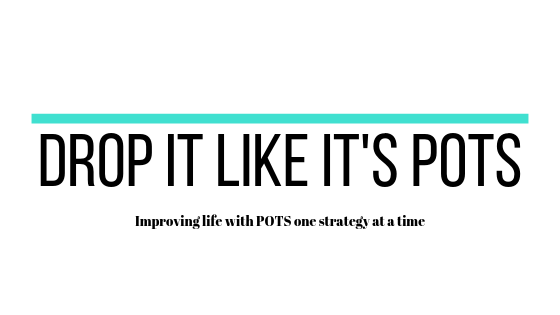In honor of Dysautonomia Awareness month, I thought I would share my whole POTS and ME story.
2007- Possibly the beginning
I had some sort of post-viral fatigue in college in 2007. One doctor said I didn’t have mono, another doctor said I did, so I never knew for sure what happened. I recovered after a few months of using Monolaurin and taking a break from training. I don’t know if this has anything to do with what I am going through now, but there are some similarities that make me wonder.
2015- Very pregnant

Pregnancy with my second son was rough. I would get pre-syncopal from standing up too fast or raising my arms above my head. The fatigue was pretty intense as well. When I checked into the hospital to be induced I found out I was quite anemic, so that was probably a large factor in what I experienced.
2016- Having an infant
I felt like a typical exhausted parent of a baby throughout 2016, but was still functioning. I was breastfeeding, getting mastitis like it was my job, and getting zero sleep. So, I just kept telling myself I would feel better once my son was weaned.
Spring 2017- Constantly sick
I got 3 sinus infections in the span of 3 months. I continued to feel more fatigued and like I was scraping by to function.
Summer 2017- Tests on tests
I decided to try a Whole 30 to remedy my energy problem. Towards the end of the Whole 30 I started having worse fatigue, muscles feeling “gassed”, orthostatic intolerance, brain fog, dizziness, hip flexors weakening dramatically, low grade fevers, etc. While the fatigue was gradual everything else came on suddenly.
My primary care doctor ran a battery of tests and they all came back normal. I also went to the ER a couple times when I became pre-syncopal because I was scared. The ER ran a bunch of tests that came back normal and referred me to a cardiologist.
I actually had a tilt table at that time along with several other cardiac tests. The first tilt table I had was negative. They mentioned they were looking for me to pass out. I do not know if they were looking for POTS criteria (heart rate increase over 30bpm upon standing). When I took that initial tilt table I was still tripping big time on some medication the hospital gave me a day or two prior. The ER doctor warned me that the medication makes some people have this urge to “get out of here”, and I was like “Psht, I’ll be fine”. Nope. Not fine. Then, my primary doctor gave me a medication to counteract it and it made things way worse. The situation was a mess.
So, I don’t know for sure why my first tilt table did not indicate POTS. It could have been the factors I mentioned above or something else. I didn’t know anything about POTS back then, so I moved on.
Fall 2017- Internal Medicine and Integrative Medicine
After all the tests from my primary care doctor and cardiologist came back normal, I was referred to an internist. He ran some tests and they were also all normal. At my urging, he referred me to a neurologist who also ran some tests. He determined I was fine and sent me back to the internist. The internist went on to insist I was latently depressed. In addition to being incorrect, he was condescending and rude, so I had to move on.
I felt like all doors were closed and didn’t know what to do next. A few people recommended that I try integrative medicine. I was very grateful for it at the time because I felt like I finally had answers. Unfortunately, they were the wrong answers. I discussed these mistrials during my posts Pre-Diagnosis Treatments Part 1 and Pre-Diagnosis Treatments Part 2. I also tried chiropractic care then, which was not the right answer for that time.
Spring 2018- University System ER
I continued to get sicker while being treated with chiropractic care and integrative medicine. It was time to start from scratch and get re-evaluated. I made an appointment with a university system’s Internal Medicine department. The appointment was 4 months away. I tried waiting, but I was getting concerned.
One particularly bad day I decided to go to the emergency room of that university system thinking maybe I could get help or get my appointment moved up. Nope. The PA that worked with me treated me very harshly and insisted I was depressed and needed to get neuropsych testing.

It has to be said
This thought process of “We don’t know what it is, therefore it must be mental illness” has to stop. It takes on average 5 years and 11 months for people to get diagnosed with POTS. This is partly due to a lack of awareness and also due patients being told “it is all in their head”. 85% of people with POTS have been told that their problem is psychological by doctors. That is appalling. It is time that doctors become educated on the various forms of dysautonomia as well as ME. Now excuse me while I step off of my soap box.
Spring 2018- Back to my primary
The day after my visit to the university ER, I went to my primary and asked him if I should get neuropsych testing. My primary said no. He saw me all along and knew there was something physical going on. He ran a few more tests and did an e-consult with the Mayo Clinic. The tests were all normal and Mayo didn’t know what else to try without seeing me in person. My primary recommended that I go to Mayo in person.
I have to take a moment and give credit to my local primary care doctor. He was an awesome advocate for me from day one. He went above and beyond what his duties were and helped me navigate the system.
Summer 2018- Getting into Mayo
The process to get into Mayo was not easy. First, I tried to get in with their internal medicine department. After a few weeks of waiting, they turned me down as a patient. That was a devastating let down. My primary care doctor suggested I try a specialized department. We debated which department to go with because we had no clue what was going on but ultimately decided that neurology would be a good starting place. I went through the process again of sending records, getting a referral, etc. After a few weeks I called Mayo and they said I was accepted as a patient. My appointment was a month after that.
While I was waiting for my appointment at Mayo I read this article about Tori Foles which told her story about getting diagnosed with POTS. Her story struck me with how similar it was to mine. I did more research on POTS and did a “poor man’s tilt table test“. My heart rate jumped up by 40bpm when I stood so I thought I would mention that to the doctor at Mayo.
August 2018- Mayo
My first appointment at Mayo was with a neurologist, Dr. Ralitza Gavrilova. She was thorough and kind. She even asked me what my thoughts were. I told her about the “poor man’s tilt table” results and asked if we could repeat a tilt table test. She had no qualms and ordered that and a few other tests. She also referred me to the Chronic Fatigue and Fibromyalgia clinic.
I had an appointment with Dr. Kevin Fleming as part of the Chronic Fatigue and Fibromyalgia Clinic the week I was at Mayo. He looked over my history and results and told me that I had POTS and ME. He spent an hour showing me studies that demonstrate the physiological changes that happen in ME and POTS. It was all a blur, so I hardly remember any of it.
Dr. Fleming prescribed me a very comprehensive treatment plan including propranolol (beta blocker), fluids, electrolytes, ginseng, vitamins B6 and C, deep breathing, exercise, vestibular retraining exercises, etc. He also recommended that I attend Mayo’s Chronic Fatigue and Fibromyalgia Seminar. He said the majority of it discusses chronic pain (which I don’t have), but that I can replace “pain” for “fatigue” and apply the principles accordingly.
August 2018- Chronic Fatigue and Fibromyalgia Seminar at Mayo
I have mixed feelings about this seminar. It was 2 days long and taught the current understanding of chronic fatigue and chronic pain as well as skills to cope with them.
Pros:
- Taught the basics of meditation and deep breathing
- Taught important life skills to have when you are chronically ill
Cons:
- Cost
- Very psychologically based- I was hoping for more physical help being newly diagnosed at the time
- A lot of it was common sense
I will discuss the principles I learned here in separate posts but to give you an idea, examples include: the importance of getting ready every day even if you feel like crap, pacing for steady energy, how napping jacks up your nighttime sleep quality, and not doing “sick behaviors”.
Fall 2018- Finding a doctor at home
Mayo told me to find a doctor to continue care locally. There were no cardiologists or neurologists in our system who had any specialty or experience with dysautonomia. So, I tried to get in at a university system. They said they don’t accept POTS patients and instead refer them to Mayo.

Luckily, a friend whose husband is a doctor asked around for me and found an internal medicine doctor who was not experienced with POTS, but was willing to follow Mayo’s protocol and treat me.
Ever since then I have been working with that internist and continually trying new things to treat the POTS and ME. She has been open to my questions/ideas and was honest when she ran out of ideas for me, which I appreciate. She also referred me to physical therapy for dizziness and that has allowed me to drive short distances again.
2019- Consultations
Currently, I do phone consultations with a neurologist at the Dysautonomia Clinic, Dr. Svetlana Blitshteyn. She is very highly regarded as a specialist in dysautonomia. She regularly presents on dysautonomia and has done great things to further awareness and understanding. I have had a good experience working with her. I bring her recommendations to my local internist who does the actual prescribing.
I have also done two phone consultations with a nutritionist, Jill Brook, that also works at the Dysautonomia Clinic. She has POTS herself and was very helpful in teaching me about how diet impacts disease, gut health, taste buds, foods to improve my copper deficiency, healthier food swaps, and more. Jill also has a blog where she teaches about nutrition and chronic illness.
How has your POTS, ME, or chronic illness journey been? Do you have any tips or words of wisdom to share?
The struggle of diagnostic delay and proper care for certain diseases is real. If this story resonates with you and you have questions, feel free to reach out at dropitlikeitspotsblog@gmail.com.
Disclaimer: I am not a medical professional. Statements on this site are not meant to be taken as medical advice. These statements reflect my personal experiences having mild-ish post-viral POTS and ME. Due to the wide spectrum of these diseases, comorbidities, and everyone being different, your experiences may be very different than mine.
Note: If you post a comment, this site does NOT have a feature to notify you of responses to your comment. I have not found a good solution for that yet. However, I usually respond to every comment in a timely manner, so be sure to check back.

6 Comments
It’s been a frustrating journey and I feel if doctors were better educated about POTS you and so many others wouldn’t have to go undiagnosed for so long! When you were so sick and no one could figure it out it was frightening. And when lazy doctors would write it off as depression rather than search for what was really wrong, it was both disheartening and infuriating. It saddens me when I hear the statistics of how long it takes a person with chronic illness to be diagnosed. I’m so grateful to Mayo for listening to you and helping make the diagnosis!
How challenging your path has been! You’re quite tenacious! I can see where many would just give up & go, “OK” I’m depressed then. Thank God you’re primary care doctor was so much in your corner! Not to be so cliche, but i think it’s fitting, “Keep on truck’n!”